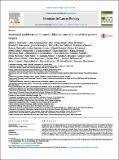Por favor, use este identificador para citar o enlazar a este item:
http://hdl.handle.net/10261/135784COMPARTIR / EXPORTAR:
 SHARE SHARE
 CORE
BASE CORE
BASE
|
|
| Visualizar otros formatos: MARC | Dublin Core | RDF | ORE | MODS | METS | DIDL | DATACITE | |

| Título: | Sustained proliferation in cancer: Mechanisms and novel therapeutic targets |
Autor: | Feitelson, Mark A.; Sánchez García, Isidro CSIC ORCID | Palabras clave: | Cancer stem cells Proliferation Natural products Therapeutic targets Cancer hallmarks |
Fecha de publicación: | 2015 | Editor: | Elsevier | Citación: | Seminars in Cancer Biology 35(Supl.): S25-S54 (2015) | Resumen: | Proliferation is an important part of cancer development and progression. This is manifest by altered expression and/or activity of cell cycle related proteins. Constitutive activation of many signal transduction pathways also stimulates cell growth. Early steps in tumor development are associated with a fibrogenic response and the development of a hypoxic environment which favors the survival and proliferation of cancer stem cells. Part of the survival strategy of cancer stem cells may manifested by alterations in cell metabolism. Once tumors appear, growth and metastasis may be supported by overproduction of appropriate hormones (in hormonally dependent cancers), by promoting angiogenesis, by undergoing epithelial to mesenchymal transition, by triggering autophagy, and by taking cues from surrounding stromal cells. A number of natural compounds (e.g., curcumin, resveratrol, indole-3-carbinol, brassinin, sulforaphane, epigallocatechin-3-gallate, genistein, ellagitannins, lycopene and quercetin) have been found to inhibit one or more pathways that contribute to proliferation (e.g., hypoxia inducible factor 1, nuclear factor kappa B, phosphoinositide 3 kinase/Akt, insulin-like growth factor receptor 1, Wnt, cell cycle associated proteins, as well as androgen and estrogen receptor signaling). These data, in combination with bioinformatics analyses, will be very important for identifying signaling pathways and molecular targets that may provide early diagnostic markers and/or critical targets for the development of new drugs or drug combinations that block tumor formation and progression. | Descripción: | Under a Creative Commons license.-- et al. | Versión del editor: | http://dx.doi.org/10.1016/j.semcancer.2015.02.006 | URI: | http://hdl.handle.net/10261/135784 | DOI: | 10.1016/j.semcancer.2015.02.006 | Identificadores: | doi: 10.1016/j.semcancer.2015.02.006 e-issn: 1096-3650 issn: 1044-579X |
| Aparece en las colecciones: | (IBMCC) Artículos |
Ficheros en este ítem:
| Fichero | Descripción | Tamaño | Formato | |
|---|---|---|---|---|
| novel therapeutic targets.pdf | 7,13 MB | Adobe PDF |  Visualizar/Abrir |
CORE Recommender
PubMed Central
Citations
242
checked on 02-may-2024
SCOPUSTM
Citations
483
checked on 29-abr-2024
WEB OF SCIENCETM
Citations
410
checked on 27-feb-2024
Page view(s)
367
checked on 06-may-2024
Download(s)
579
checked on 06-may-2024

